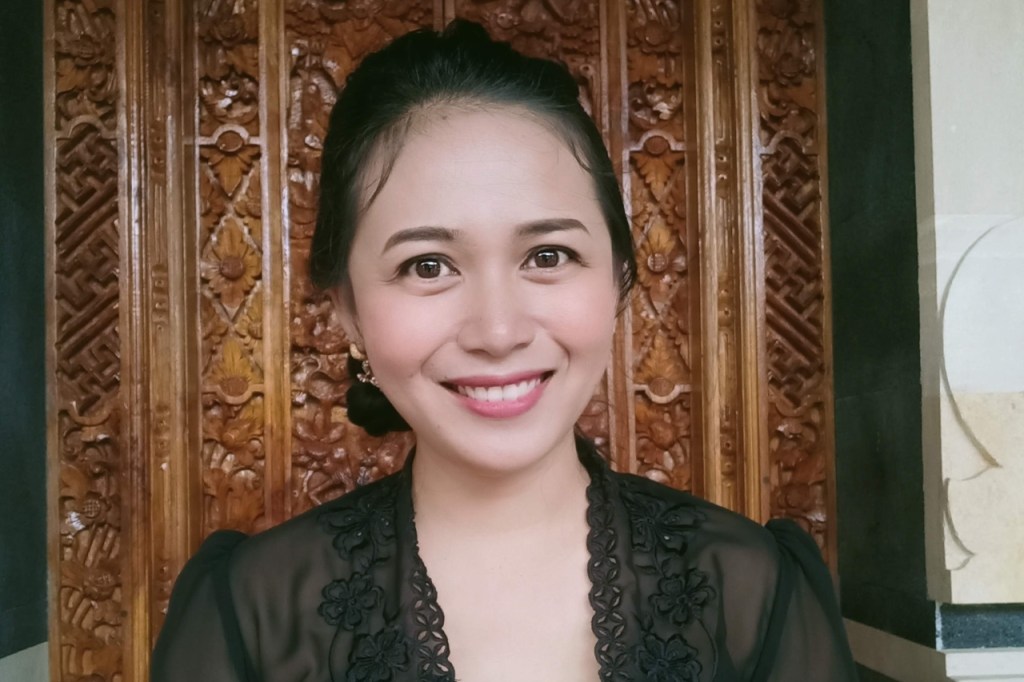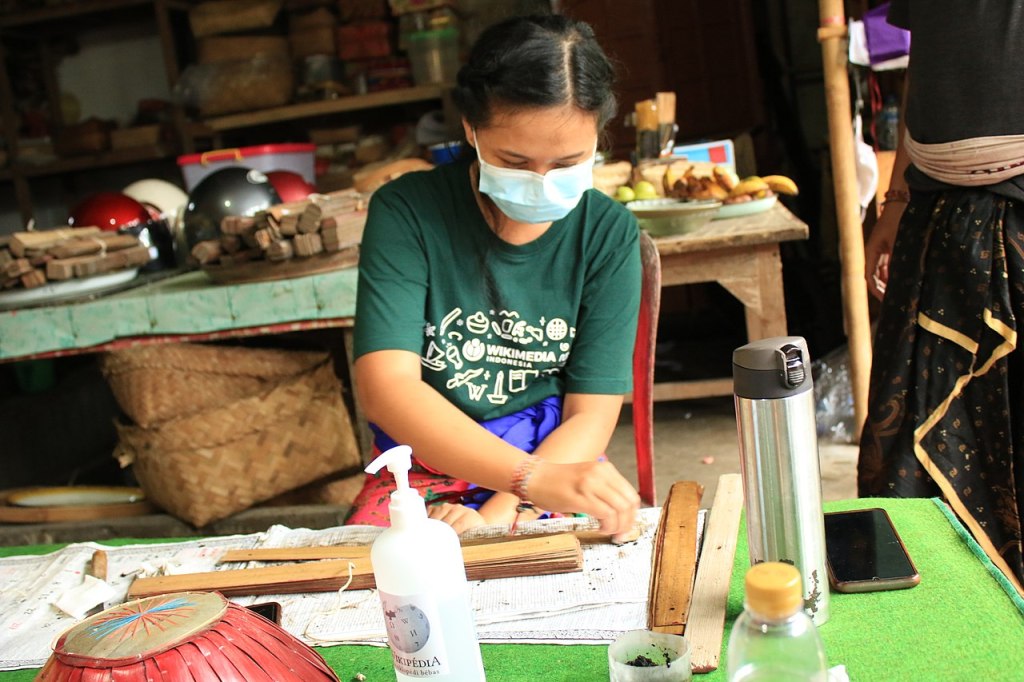
This year’s seven Wikimedian of the Year award winners were announced today at the 2021 virtual Wikimania convening. Read the interview below with Carma Citrawati, recipient of the Newcomer of the Year Award.
Carma Citrawati is a writer and Balinese literature activist, joining Wikimedia in 2019 to help the Balinese community develop WikiPustaka (Wikisource in Balinese), aiming to build a library consisting of Balinese language sources.
Carma spearheaded efforts to digitize and translate ancient Balinese manuscripts written on palm leaves. She is also an organizer of the Denpasar Wikimedians community and has been active in participating in Wikimedia Indonesia’s online meetups and community meetings.
“ For me, Wikimedia is a sweet home to share and complement each other.”
Additionally, Carma writes short stories and poems in Balinese. Her book, Kutang Sayang Gemel Madui received the Rancage Literature Award.
An initiative started in 2021 – the Wikimedian of the Year Newcomer of the Year award recognizes an exceptional Wikimedian who joined the movement in the past one to two years and already made a significant contribution.
This recognition is one of seven awards made this year to celebrate contributors who have made an exceptional impact on our movement. The awards were announced at this year’s virtual Wikimania celebration by Wikipedia Founder Jimmy Wales (watch the announcement!).
“As Newcomer of the Year, Citra embodies the spirit of curiosity and community that marks so many of us in the movement. Her work has brought increased visibility to Balinese Wikisource and helped support one of our smaller language Wikiprojects. I applaud her enthusiasm and advocacy for free knowledge within her community, and I can’t wait to see what she does next!”
– Jimmy Wales
We spoke with Carma to learn more about her experiences and perspectives on the Wikimedia movement. Here are some highlights:
Q: What was the process of translating and digitizing ancient palm leaves like?
“To digitize manuscripts, I usually prepare a few things. First, I prepare the tools to digitize, such as cameras, a piece of cloth for photographing mat, and a lamp for lighting. Second, I ensure that the manuscripts are ready to be digitized, making sure that the Balinese script can be read clearly. Thirdly, I create metadata for the manuscript. This is to identify the image and information of manuscripts. The challenge is to recognize the handwriting carved on image manuscripts, and to identify the style of the Lontar writer. It is indeed both challenging and exciting.”
Q: What is important about this project to your community and beyond?
“Many manuscript owners in Bali don’t have a catalog for their manuscript collections. I assist the Balinese people in preserving their manuscript data on a digital platform, and I have a chance to learn and create manuscript metadata, to retype and to proofread manuscripts. The benefits are intended for Balinese people in general; meanwhile, researchers can access the data collected into one digital platform. In the future, Wikipedia can be an important resource for storing and understanding manuscripts.”

Q: Has there been a favorite quote or piece of literature that you’ve encountered in your work?
There is one quote that resonates in my heart and hopefully I can take advantage of time before getting old same as the reeds in that quote.
“patūte dumadi janma, sanune cerik gulitik, malajaḥ mangulik śāstra, anake lingsir̀ tunasin, sakañcan tuture luwiḥ, kottamane dadi hidup, mānuṣane kadi lalang, tajĕp yan sanune cerik, dadi puntul, tūr̀ bingung yan suba tua (Geguritan Lokika).”
Translated to English:
“Suppose to be a human being, one is diligent as a young, immerses on literatures, asks to the elder, all glorious knowledges, the most precious thing in life, humans are like reeds, sharp when young, become blunt, and confused when old (Geguritan Lokika)”
“I believe that a small contribution is more valuable than stopping and giving up.”
Q: The Wikimedia movement strives to engage more women contributors and close the gender gap on our projects. What lessons can be learned from the Wikimedia Balinese community, which has a larger share of women contributors than men?
“I feel delighted that not only men are willing to contribute, but also women. This is our advantage in the community. In my opinion, Wikimedia Denpasar, is a great place for women to explore and express themselves freely.”
Q: What advice would you give to other contributors working on small language Wikimedia projects?
“To everyone that is still moving and working in small languages on Wikimedia projects, keep spirits. Perhaps, as I did, you will face many challenges for your project. Don’t hesitate and keep going. It doesn’t matter if you progress slowly, but do your best for every opportunity. I believe that a small contribution is more valuable than stopping and giving up.”
Q: What’s the most surprising or interesting thing you’ve learned from contributing to Wikimedia?
“Actually everything that I do on Wikimedia is a new experience. From writing articles on Wikipedia, to retyping manuscripts on Wikisource, to creating Balinese Wiktionary, and collaborating with other communities, all of it fascinates me. The most interesting part of contributing on Wikimedia is meeting different kinds of people who make great contributions to my local language. Wikimedia is a good place not only to free knowledge, but also to meet people who are passionate about language. For me, Wikimedia is a sweet home to share and complement each other.”
Congratulations, Carma!
About the 2021 Wikimedian of the Year Awards
The Wikimedian of the Year is an annual award that honours contributors to Wikimedia projects, including Wikipedia editors, to highlight major achievements within the Wikimedia movement in the previous year. The tradition dates back to 2011 and has evolved since then in dynamic ways to welcome and celebrate Wikimedians from different backgrounds and experiences. This year’s celebration is bigger and more inclusive than ever before, recognizing seven exceptional contributors to the Wikimedia movement in six categories, including Newcomer of the Year, 20th Year Honouree, Rich Media and Tech contributors, and Honourable Mentions, as well as the Wikimedian of the Year.
*This interview has been edited for clarity and length.

Can you help us translate this article?
In order for this article to reach as many people as possible we would like your help. Can you translate this article to get the message out?
Start translation